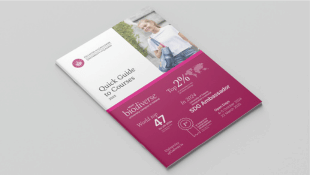-
Courses

Courses
Choosing a course is one of the most important decisions you'll ever make! View our courses and see what our students and lecturers have to say about the courses you are interested in at the links below.
-
University Life

University Life
Each year more than 4,000 choose University of Galway as their University of choice. Find out what life at University of Galway is all about here.
-
About University of Galway

About University of Galway
Since 1845, University of Galway has been sharing the highest quality teaching and research with Ireland and the world. Find out what makes our University so special – from our distinguished history to the latest news and campus developments.
-
Colleges & Schools

Colleges & Schools
University of Galway has earned international recognition as a research-led university with a commitment to top quality teaching across a range of key areas of expertise.
-
Research & Innovation

Research & Innovation
University of Galway’s vibrant research community take on some of the most pressing challenges of our times.
-
Business & Industry

Guiding Breakthrough Research at University of Galway
We explore and facilitate commercial opportunities for the research community at University of Galway, as well as facilitating industry partnership.
-
Alumni & Friends

Alumni & Friends
There are 128,000 University of Galway alumni worldwide. Stay connected to your alumni community! Join our social networks and update your details online.
-
Community Engagement

Community Engagement
At University of Galway, we believe that the best learning takes place when you apply what you learn in a real world context. That's why many of our courses include work placements or community projects.
Funding for Study Abroad
An important part of the decision making process for partaking in studying abroad is determining the costs that you will incur whilst abroad. Whilst on exchange programme, students pay their fees as normal to University of Galway and are not required to pay tuition fees to the partner institution. You will need to budget for flights, accommodation, food, insurance and other general expenses. Some countries are more expensive than others, as are some cities, and the level of extra expenditure involved will also depend on whether or not you are currently living at home. If you are, you will find that accommodation will become a major cost. However, if you are already paying rent in Galway, you might find that accommodation costs are cheaper abroad than they are here in Ireland.
Financial Planning
Costs to consider for Study Abroad
Flights
You will need to pay for flights to and from your destination. If you're going for a full year of study and intend to return home for the Christmas break make sure to include the cost of these flights.
Accommodation
You will need accommodaiton for your entire time abroad. If staying in on campus accommodation you will only be able to check in from a specific date and have to check out once term ends. If you need to arrive earlier or depart later you will need to budget for accommodation for those nights.
Utilities
Make sure to check if these are not included with your rent. If not, you will need to budget for them.
Food/Groceries
Grocercies prices will vary depending on your destination. Numbeo.com is a website that uses crowd sourced data to compile cost of living information from across the world. If consulting this for anticipated costs abroad, ensure to check when the information was last updated.
Some universities in the USA may require you to take out a meal plan which can be an additional cost on top of your accommodation fees. You can find information about this on the host university accommodation pages.
Travel
If you're not living close to campus, you'll need to budget for a travel card. It's important to factor in the costs of buses or trains to your destination if the airport you're flying into is not close by.
Visa Fees and Financial Evidence
You don't require a visa to study in Europe if you hold a passport of an EU member state. If you do not hold an EU passport, you will need to consult the relevant host countries immigration website to check if a visa is required.
Students intending to study in the USA, Canada, Hong Kong, Australia, South Korea, Japan, China, Chile, or Mexico will generally require a visa to study there. There are costs associated with the relevant visa. To find out about these costs, please consult the relevant host countries immigration website. You will also have to provide proof that you have enough funds to support yourself for the duration of your study abroad period. This can sometimes be required when making an initial application to the partner university. The level of financial evidence you will need to show will differ depending on your destination but will be available on the host countries embassy website.
You can use the following as proof of funds:
- Up to date personal bank statements
- Letter from your bank on headed paper
- You may be able to use bank statements from a parent or guardian providing a letter is also provided from the account holder confirming the funds are available to you
- Confirmation of your SUSI funding and the amount you receive
Incidental Expenses
Such as clothes, bed linen, utensils or a mobile phone plan. Students often take out a local phone plan for their time abroad as it's cheaper than relying on data roaming.
Medication
It is worthwhile to check the cost of any medication you require abroad in case it's more expensive than in Ireland
Travel Insurance
This is a requirement for all students undertaking Study Abroad as part of their programme at University of Galway. More information can be found in the Whilst Abroad Information page.
Health Insurance / Medical Insurance
Some partner universities will require you to take out a specific insurance package whilst studying at their institution. In the USA, this is a requirement in most universities and it can be quite a considerable expense. Information on the cost of insurance will be available on the partner universities website.
Material / Books / Registration Fees
You may need to buy books or pay an additional fee for some services at the partner university such as registration fees, gym fees, or similar. These fees are particularly common in the USA/Canada, and can run up to a couple of hundred dollars in some cases. Consult reports from students that destination previously to check if there were any addionitional fees.
Language Classes
Host universities sometimes charge language students for these. Erasmus students may be eligible to claim the cost of language courses back in addition to their grant.
Estimated Costs Per Destination
This document contains estimated costs as of October 2024. We recommend referring to the official host university websites for the most accurate and up-to-date information regarding fees and living costs.
Estimated Cost for Study Abroad 2024
Grants and Funding
Erasmus Funding
Students completing studies at an Erasmus study destination will be eligible to apply for an Erasmus Mobility Grant to cover part of the cost of their study visit.
Students with disabilities or additional needs may be entitled to apply for extra funds from the Erasmus programme.
Some students who are deemed to be financially disadvantaged may qualify for the Social Inclusion Supplementary Support Initiative (SISSI).
More information can be found on the Erasmus Website.
International Exchanges
Students partaking in exchanges outside of Erasmus destinations do not receive a grant.
The College of Science and Engineering provide a limited amount of funding to their outgoing students that varies by host. Find out more on their Study Abroad page.
Some exchange places do have scholarships that students can for to support their exchange. If successful, scholarships are generally applied after you arrive at your destination so you should bare this in mind when planning for your exchange.
International Exchange Scholarships
College of Arts, Social Sciences, & Celtic Studies
- Boston College Students nominated to attend Boston College for a full year receive a scholarship of $5,000 approximately. In return, students are asked to work on campus.
- Berea College Students nominated to attend Berea College receive room and board as part of their exchange. This scholarship is Programme specific and only available to students enrolled on Bachelor of Arts - Drama, Theatre, and Performance Studies.
College of Business, Public Policy and Law
- Villanova University - McGuinn Irish Scholars Program provides financial assistance to support students from Ireland to study at Villanova University. Students are nominated for this opportunity after a selection process in consultation with Villanova University faculty and staff.
College of Science and Engineering
- Villanova University - Katherine Cosgrove Scepansky and Katherine Therese Scepansky Scholarship This generous scholarship is awarded every other year to an exchange student to attend Villanova University. The scholarship award provides room and board, books, and fees for one semester. This scholarship does not cover airfare and any other related travel expenses. Students are nominated for this opportunity in consultation with Villanova University faculty and staff.
- Purdue University - Fort Wayne Metals Scholarship The FW Metals Scholarship of €6000 per student, per annum, will facilitate travel for two outstanding students to study at Purdue University (August to May each year), and intern with Fort Wayne Metals, Ireland (May to September each year).
- St Marys College at California- Jeanine Shahna Fela Endowed Scholarship Fund An endowed scholarship fund established by Gene and Patricia Fela in honor of their daughter. This endowment provides funds for a student exchange program between Saint Mary’s College and University of Galway.
Working Whilst Abroad
The ability to work whilst your abroad will depend on your visa.
For Erasmus students, if you are an EU citizen, you will have the same right to work while studying as nationals of that country but some host universities have a rule about the number of hours that exchange students may work during term-time.
For students studying outside of Erasmus destinations, you will need to check your Visa and ensure there are no restrictions on working before you apply for a job. Some visas may only allow you to work on campus, whilst some students have experienced lengthy wait for Social Security numbers in North America so were unable to work whilst on exchange.
Downloads
-

Undergraduate Prospectus 2026 PDF (12.4MB)
-

Postgraduate Prospectus 2026 PDF (3.2MB)
-

Quick Guide to Courses 2026 PDF (1.20MB)
-

A-Level Quick Guide to Courses 2025 PDF (1.04MB)
-

Pre-Arrival Guide 2025 PDF (1.6 MB)
-
.png)
Brazil Student Guide PDF (3.2 MB)
-
.png)
Chile Student Guide PDF (3.1 MB)
-
.png)
Colombia Student Guide PDF (3.1 MB)
-
.png)
Ghana Student Guide PDF (3.4 MB)
-

Hong Kong Student Guide PDF (3.6 MB)
-

Indian Student Guide PDF (3.5 MB)
-
.png)
Indonesian Student Guide PDF (3.2 MB)
-

Malaysian Student Guide PDF (3.6 MB)
-
.png)
Mexico Student Guide PDF (3.1 MB)
-

Nigeria Student Guide PDF (3.4 MB)
-
.png)
North American Student Guide PDF (2.9 MB)
-
.png)
Panama Student Guide PDF (3.1 MB)
-

South African Student Guide PDF (3.7 MB)
-
.png)
Taiwan Student Guide PDF (4.0 MB)
-
.png)
Thailand Student Guide PDF (3.6 MB)
-
.png)
Turkish Student Guide PDF (4.2 MB)
-
.png)
UAE Student Guide PDF (3.4 MB)
-
.png)
Vietnam Student Guide PDF (3.39 MB)















